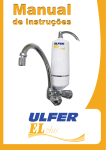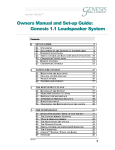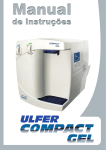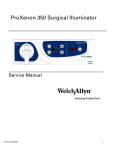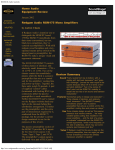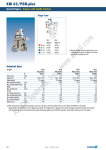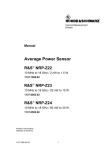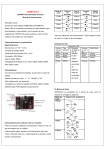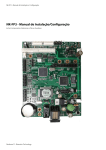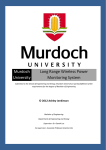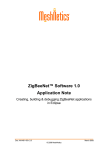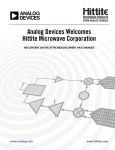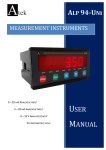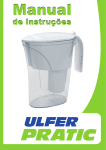Download Micrium Catalogue 2013
Transcript
Reliability that’s out of this world Micrium is a global RTOS leader and a top choice of embedded engineers building microprocessor, microcontroller, and DSPbased devices. Our commercial RTOS components are the preferred solution over open source and competitive alternatives. Micrium, Inc. 1290 Weston Road, Suite 306 Weston, FL 33326 USA +1 954 217 2036 www.micrium.com Micrium Catalogue 2013 Cover.indd 1 2013-02-11 12:03 PM Micrium Catalogue 2013.fm Page 1 Monday, February 11, 2013 11:52 AM Table of Contents 2 Mars Curiosity Rover 3 Owens Valley Radio Observatory 4 Micriµm Kernels 12 Micriµm Communication Components 18 Micriµm Storage & Display Components 20 Micriµm Tools 22 Micriµm Licensing 24 Micriµm Distributors Micrium RTOS & Tools Page 1 Micrium Catalogue 2013.fm Page 2 Monday, February 11, 2013 11:52 AM Mars Curiosity Rover Micriµm is pleased to be part of the ongoing success of the Mars Rover, Curiosity. Micriµm’s uC/OS-II was chosen to control one of the analytical labs aboard the Curiosty rover. The lab, called SAM (Sample Analysis at Mars) is designed to investigate the chemical and isotopic composition of the Martian atmosphere and soil. It conducts a sensitive search for organic compounds and measures the isotopic composition of carbonaceous material extracted from powdered solid surface samples. SAM’s investigations support the mission goal of quantitatively assessing the habitability of Mars, an essential step in the search for past or present life on Mars, with investigations in Gale Crater. “This is the first time that our RTOS kernel, µC/OS-II has left the earth’s gravity and been trusted with such an important mission,” said Jean Labrosse Micriµm’s President and CEO. “We are proud that the reliability and stability of one of our key products has earned it a place in NASA’s toolbox. We are confident that this quality is also a key selection criteria for embedded engineers making everyday products here on Earth.” Jean continued, “This is the first time that Micriµm has left the Earth’s gravity – but not the last.” For more information: http://ssed.gsfc.nasa.gov/sam/ Page 2 Micrium RTOS & Tools Micrium Catalogue 2013.fm Page 3 Monday, February 11, 2013 11:52 AM Owens Valley Radio Observatory Micriµm’s µC/OS-II is an essential component of Caltech’s Owens Valley Radio Observatory (OVRO). OVRO is one of the largest university-operated radio observatories in the world. The observatory is located near Bishop, California, approximately 250 miles north of Los Angeles on the east side of the Sierra Nevada. OVRO uses its telescopes and other instruments to refine the locations of radio sources in the sky, as well as to study hydrogen clouds within the Milky Way. The observatory is different from other national radio observatories because of its extensive work with graduate students, who can come to the observatory for long-term observation, benefitting not only the students, but also the observatory as it allows for more comprehensive projects to take place. The correlator system is a major component of Caltech’s Owens Valley Radio Observatory. The correlator system is used to digitize and process the radio-frequency (RF) signals from OVRO’s six telescope radio interferometer. Micriµm µC/OS-II is used in the OVRO radio telescopes. The radio telescope station runs on 120 DSPs each running uC/OS-II. In other words, there are 120 processors running uC/OS-II in this application. For more information: http://www.ovro.caltech.edu/ Micrium RTOS & Tools Page 3 Micrium Catalogue 2013.fm Page 4 Monday, February 11, 2013 11:52 AM Micriµm Kernels What is µC/OS-III? µC/OS-III is a highly portable, ROMable, scalable, preemptive, real-time, deterministic, multitasking kernel for microprocessors, microcontrollers and DSPs. What does it do? Offering unprecedented ease-of-use, µC/OS-III is delivered with complete 100% ANSI C source code and in-depth documentation. µC/OS-III runs on the largest number of processor architectures, with ports available for download from the Micriµm web site. µC/OS-III manages an unlimited number of application tasks, constrained only by a processor’s access to memory. µC/OS-III also supports an unlimited number of priority levels (typically configured for between 8 and 256 different priority levels). µC/OS-III allows for unlimited tasks, semaphores, mutexes, event flags, message queues, timers and memory partitions. µC/OS-III provides features to allow stack growth of tasks to be monitored. While task size is not limited, they need to have a minimum size based on the CPU used. µC/OS-III allows multiple tasks to run at the same priority level. When equal priority tasks are ready-to-run, µC/OS-III runs each for a user-specified amount of time. Each task can define its own time quanta and give up its time slice if it does not require the full time quanta. µC/OS-III provides extensive range checking which can be disabled at compile time. µC/OS-III thus checks for NULL pointers passed in API calls, task level services from ISRs aren’t called, arguments are within allowable range, and specified options are valid. Each API function provides an error code regarding the outcome of the function call. µC/OS-III’s footprint can be scaled to contain only the features required for a specific application (typically 6–24 KBytes of code space residing in memory). Page 4 Micrium RTOS & Tools Micrium Catalogue 2013.fm Page 5 Monday, February 11, 2013 11:52 AM Features Multi-threaded applications The features of µC/OS-II include: • Preemptive multitasking real-time kernel with optional round robin scheduling • Delivered with complete, clean, consistent, 100% ANSI C source code with in-depth documentation. • Mutual exclusion semaphores with built-in priority inheritance protocol to prevent priority inversions • Timeouts on ‘pend’ calls to prevent deadlocks • Unlimited number of tasks, priorities and kernel objects • Highly scalable (6K to 24K bytes code space, 1K+ bytes data space) • Very Low Interrupt Disable Time • Extensive performance measurement metrics (configurable) • Third party certifiable µC/OS-III allows developers to produce multi-threaded applications, vital to the development of safety-critical systems. Thanks to improved integration with IAR Embedded Workbench for ARM, developers can access all the inherent non-reentrant features of C/C++ in a thread-safe manner. Application developers who write code for use in multi-threaded environments will find the support critical when protecting shared objects using system locks, file-stream locks, and thread-local storage (TLS) in multi-threaded environments. Micrium RTOS & Tools Page 5 Micrium Catalogue 2013.fm Page 6 Monday, February 11, 2013 11:52 AM Available ports Page 6 Micrium RTOS & Tools The following table contains the currently available and supported list of CPU architecture for µC/OS-III. A new port can easily be written or adapted to the customer specific needs either by the customer or Micriµm. Please contact our sales department for more information about supported platforms or port developments. Manufacturer CPU Altera Nios II Analog Devices Blackfin ARM ARM7 ARM9 ARM11 Cortex-A8 Cortex-A9 Cortex-R4 Cortex-M0 Cortex-M1 Cortex-M3 Cortex-M4(F) ATMEL AVR AVR32 Freescale ColdFire HCS12 IBM PowerPC 405 Microchip PIC24 PIC32 Microsoft Win32 Renesas 78K0R RL78 RX200 RX600 SuperH 2A V850E/2/S Texas Instruments MSP430 Xilinx MicroBlaze Micrium Catalogue 2013.fm Page 7 Monday, February 11, 2013 11:52 AM Micriµm Kernels What is µC/OS-II? µC/OS-II is a portable, ROMable, scalable, preemptive, real-time deterministic multitasking kernel for microprocessors, microcontrollers and DSPs. What does it do? Offering unprecedented ease-of-use, µC/OS-II is delivered with complete 100% ANSI C source code and in-depth documentation. µC/OS-II runs on the largest number of processor architectures, with ports available for download from the Micriµm Web site. µC/OS-II manages up to 250 application tasks. µC/OS-II includes: semaphores; event flags; mutual-exclusion semaphores that eliminate unbounded priority inversions; message mailboxes and queues; task, time and timer management; and fixed sized memory block management. µC/OS-II’s footprint can be scaled (between 5 Kbytes to 24 Kbytes) to only contain the features required for a specific application. The execution time for most services provided by µC/OS-II is both constant and deterministic; execution times do not depend on the number of tasks running in the application. A validation suite provides all documentation necessary to support the use of µC/OS-II in safety-critical systems. Specifically, µC/OS-II is currently implemented in a wide array of high level of safety-critical devices, including: • Those certified for Avionics DO-178B • Medical FDA pre-market notification (510(k)) and pre-market approval (PMA) devices • SIL3/SIL4 IEC for transportation and nuclear systems, 99% compliant with the Motor Industry Software Reliability Association (MISRA-C:1998) C Coding Standards Micrium RTOS & Tools Page 7 Micrium Catalogue 2013.fm Page 8 Monday, February 11, 2013 11:52 AM Micriµm Kernels What is µC/TimeSpaceOS? µC/TimeSpaceOS manages both memory and time allocated to diverse applications and enables the cost-effective certification of complex systems. What does it do? µC/TimesSpaceOS addresses the needs of safety-critical market segments including avionics, medical, transportation, and industrial applications. It extends existing safety-critical products with critical complex middleware such as TCP-IP, file systems and USB. Features Certification • Memory protection so that multiple applications cannot influence, disturb or interact with each other • Deterministic and run-time guaranteed • Configurable so that virtual Dynamic Random Access Memory (DRAM) is optionally available. • A small footprint for use in a wide-range of applications Other processors and compiler environments can be quickly implemented as a result of the modular architecture. Don’t hesitate to ask us about your environment – we have prepared additional processors for certification. The source code of µC/TimeSpaceOS has been implemented with the same coding standards that are utilized with the µC/OS-II kernel. DO178B and IEC61508 certifications have already been conducted multiple times. Page 8 Micrium RTOS & Tools Micrium Catalogue 2013.fm Page 9 Monday, February 11, 2013 11:52 AM Micriµm Kernels What is µC/OS-MPU? µC/OS-MPU is an extension for Micriµm’s µC/OS-II that provides memory protection, and greater stability and security for your applications. What does it do? The µC/OS-MPU extension prevents applications from accessing forbidden locations, thereby protecting against damage to safety-critical applications, such as medical devices and avionics. This system facilitates integration of Micriµm or third-party software such as: • Protocol stacks • Graphics modules • File system libraries Existing µC/OS-applications can be adapted with minimal effort. µC/OS-MPU is available for any microcontroller (MCU) containing a Memory Protection Unit (MPU). Third-party certification support is also available. Features µC/OS-MPU includes the following features: • Prevents access of forbidden locations • Appropriate for safety-critical applications • Easy integration for protocol stacks, graphical modules, FS libraries • Simplified debugging and error diagnosis • Available for any microcontroller equipped with a hardware Memory Protection Unit (MPU). Micrium RTOS & Tools Page 9 Micrium Catalogue 2013.fm Page 10 Monday, February 11, 2013 11:52 AM Micriµm Communication Components What is µC/TCP-IP? What does it do? µC/TCP-IP is a compact, reliable, high-performance TCP/IP protocol stack, optimized for embedded systems. Built from the ground up with Micriµm quality, scalability and reliability, µC/TCP-IP enables the rapid configuration of required network options to minimize time-to-market. µC/TCP-IP allows for adjustment of the memory footprint based upon design requirements. µC/TCP-IP can be configured to include only those network components necessary to the system. When a component is not used, it is not included in the build, saving valuable memory space. The µC/TCP-IP design introduces a new concept: Large and small buffers. A large buffer is of the size required to transport a complete Ethernet frame. This is what other TCP/IP stacks do. But, in an embedded system, it is quite possible that the amount of information to transmit and receive does not require the use of a full Ethernet frame. In this case using buffers of the size of full Ethernet frames is a waste of RAM. µC/TCP-IP allows the designer to maximize the system performance by defining different quantities of small and large buffers. The source code for µC/TCP-IP is an extremely robust and highly reliable TCP/IP solution. µC/TCP-IP is designed to be certifiable for use in avionics, compliant for use in FDA-certified devices, and in other safety-critical products. µC/TCP-IP requires the presence of an RTOS for task scheduling and mutual exclusion. To meet this requirement, Micriµm provides source code to allow network applications to readily accommodate µC/OS-II and µC/OS-III. Note: Based on the component’s extensible kernel interface, other non-Micriµm kernels can also be adapted to µC/TCP-IP, but are not supported. Page 10 Micrium RTOS & Tools Micrium Catalogue 2013.fm Page 11 Monday, February 11, 2013 11:52 AM Features Device controller driver The features of µC/TCP-IP include: • Delivered with complete 100% ANSI C source code and in-depth documentation. • Scalable to contain only required features and minimize memory footprint. • Zero copy buffer management. • Flexibility to select large and small buffers. • High performance. • Supports multiple interfaces. • Support for any real-time kernel available. Micriµm’s µC/OS-III or µC/OS-II is recommended. Sold separately. • Built in SSL (Secure Sockets Layer) API. Supports most SSL stacks. Contact Micriµm to learn more about the µC/SSL module developed with our partner Mocana Inc. µC/TCP-IP features a hardware abstraction layer allowing quick porting to any new Ethernet device controllers (and addition to Micriµm’s list of supported devices). Micriµm offers a large selection of Ethernet device controller drivers. Additional drivers are added on a regular basis. If your desired Ethernet device controller driver is not listed, you can consult the µC/TCP-IP user manual, which contains a chapter on driver development. You can also ask Micriµm to develop the driver for you. Please call us for a quote. Stack compliance Micriµm uses Ixia’s IxANVL to validate the compliance of the stack with the networking RFCs. IxANVL is used by Ddvelopers and manufacturers of networking equipment and Internet devices to validate protocol compliance and interoperability. Micrium RTOS & Tools Page 11 Micrium Catalogue 2013.fm Page 12 Monday, February 11, 2013 11:52 AM Micriµm Communication Components What is µC/USB-Device? What does it do? µC/USB-Device is a compact, reliable, high-performance stack for embedded systems equipped with a USB device controller. µC/CAN reduces development time to embed USB support. Thanks to a hardware abstraction layer, you can easily port µC/USB-Device to any new USB device controllers by simply modifying existing hardware access routines. µC/USB-Device uses a modular architecture with three software layers between the application and the hardware: Features Page 12 Micrium RTOS & Tools • The Device Controller Driver layer interfaces with the device controller to process interrupts, notify the device core of bus events, and receive/transmit packets. • The Device Core layer responds to host requests during enumeration and controls packet reception / transmission. • The Class layer provides functionality to the host using one or more class drivers. The features of µC/USB include: • Delivered with complete 100% ANSI C source code and in-depth documentation. • Confugurable memory footprint. • Support three speeds: low-speed (1.5 Mbit/s), full-speed (12 Mbit/s) and high-speed (480 Mbit/s). • Use with commercial or proprietary RTOS • Support for Composite devices. • Supports CDC ACM, HID, MSC, PDHC and Vendor classes. Micrium Catalogue 2013.fm Page 13 Monday, February 11, 2013 11:52 AM Micriµm Communication Components What is µC/USB Host? µC/USB Host is a real-time USB Host software stack for embedded systems equipped with a USB Host or OTG controller. What does it do? µC/USB Host is a full-featured, high performance, small footprint USB host software stack. It includes many class drivers (MSC, HID and CDC ACM). The stack requires a kernel. µC/USB Host uses a modular architecture with three software layers between the application and the hardware. Features • The Class Driver layer provides class-specific services to the application. For example, the Mass Storage Class (MSC) Driver includes interface functions for reading and writing sectors from a storage device. • The Host core layer enumerates the device, loads a matching class driver, and provides the mechanism for data transfers. • The Host Controller Driver interfaces with the host controller hardware to enable data transfers and detect devices. µC/USB Host include the following features: • Small footprint • High performance • ROMable and scalable (to reduce footprint) • Use with commercial or proprietary RTOS • Easy-to-use API Micrium RTOS & Tools Page 13 Micrium Catalogue 2013.fm Page 14 Monday, February 11, 2013 11:52 AM Micriµm Communication Components What is µC/CAN? µC/CAN is a CAN protocol framework that enables easy and clean implementation of CAN communication paths. µC/CAN is a source code library optimized for speed, flexibility and size and built with high portability and clean documentation in mind. What does it do? µC/CAN reduces development time to embed CAN. You need only an understanding of signals, messages and bus configurations. µC/CAN can communicate via one or more CAN buses simultaneously. An embedded target can also have multiple, different CAN controllers. A validation suite provides all documentation necessary to support the use of µC/CAN in safety-critical systems. Features Protocols Page 14 Micrium RTOS & Tools The features of µC/CAN include: • Hardware independent • Signal Scalability – Between 1 bit to 4 bytes • Sufficiently robust to meet rigorous safety-critical system requirements µC/CAN supports the following protocols: • CANopen Stack • CANopen Sensor Slave • CANopen Slave • CANopen Config Micrium Catalogue 2013.fm Page 15 Monday, February 11, 2013 11:52 AM Micriµm Communication Components What is µC/Modbus? What does it do? µC/CAN is a protocol framework that enables easy and clean implementation of Modbus serial communications protocol. µC/CAN reduces development time to embed Modbus. µC/Modbus supports both ASCII frames and a Remote Terminal Unit (RTU) frames. You can use either mode, at the same time if you have multiple serial interfaces. µC/Modbus supports any number of communications channels. µC/Modbus-S is a Modbus Slave (server) software component enabling an embedded system to communicate to a Modbus Master (client). µC/Modbus-M is a Modbus Master (client) component that enables communication to a Modbus Slave. Features The features of µC/Modbus include: • Multiple RS-232C and/or RS-485 ports on the same target (limited only by the number of serial ports available) • The baud rate for each port is independently adjustable. • Select Modbus ASCII or RTU on a per-channel basis. • Easily assign nearly any application variable to any Modbus holding register (up to 65536), input register (up to 65536), coil (up to 65536) or input status (up to 65536). • Scalable from 6K to 15K bytes. Compile only the function codes necessary for the target. • Works with any CPU (8-, 16-, 32-, 64-bit or DSP) • Works with or without an RTOS kernel Micrium RTOS & Tools Page 15 Micrium Catalogue 2013.fm Page 16 Monday, February 11, 2013 11:52 AM Micriµm Storage & Display Components What is µC/GUI? µC/GUI allows you to provide dynamic user interfaces for any embedded application using an LCD display. What does it do? With µC/GUI, you can create rich graphical user interfaces for your embedded applications, from simple 2D monochrome graphics to smartphone displays with 32 bits per pixel color and Alpha blending. With touch screen support activated, µC/GUI can help you design fantastic user interfaces for your product. µC/GUI is both processor-independent and LCD controller-independent. It is compatible with single-task and multitask environments, and works with any commercial RTOS or your proprietary operating system. Page 16 Micrium RTOS & Tools Micrium Catalogue 2013.fm Page 17 Monday, February 11, 2013 11:52 AM Features Highlights The features of µC/GUI include: Support for any type of LCD Bitmap Converter included Font Converter included GUIBuilder application Live preview Foreign language support Anti-aliasing Dialog boxes Multiple frame buffering Support for multiple displays and multiple layers Support for input devices Variety of fonts included Color management Run the GUI as a Windows EXE for testing User interface skinning Virtual screens larger than the physical display VNC Server included Wide variety of widgets and controls • Optimized for small size and high performance. • Supports any 8/16/32-bit CPU • Supports any type of LCD, with any controller • Configurable display size. • Virtual display support; the virtual display can be larger than the actual display. • Characters and bitmaps may be written at any point on the LCD, not just on even-numbered byte addresses. • Supports caching the display in memory, for even more performance. • Compile time switches allow for different optimizations. • Includes µC/GUI-View for detailed view of all layers in the PC simulation. • Configuration macros for any interface supported. Micrium RTOS & Tools Page 17 Micrium Catalogue 2013.fm Page 18 Monday, February 11, 2013 11:52 AM Micriµm Storage & Display Components What is µC/FS? µC/FS is a compact, reliable, high-performance and thread-safe file system for microprocessors, microcontrollers and DSPs. What does it do? µC/FS can access multiple storage media through a clean, simple API. It supports the FAT file system for interoperability with all major operating systems. An optional journaling component provides fail-safe operation, while maintaining FAT compatibility. The memory footprint of µC/FS can be adjusted at compile time based on required features and the desired level of run-time argument checking. Device drivers are available for all common media types. Features Page 18 Micrium RTOS & Tools The features of µC/FS include: • Delivered with complete 100% ANSI C source code and in-depth documentation. • Portable to virtually any platform. • Scalable to contain only required features. • Optional buffered file I/O and volume level caching. • Full FAT support including FAT12/16/32 and long file names (VFAT). • Optional journaling component for failsafe FAT operations. • Supports multiple languages with Unicode encoding. • Thread safe operations on multiple volumes and devices. • Can be used with a real-time kernel or stand-alone. Micrium Catalogue 2013.fm Page 19 Monday, February 11, 2013 11:52 AM Micriµm Storage & Display Components What is µC/Building Blocks? µC/BuildingBlocks round out the capabilities you need to complete your design. These small modules are components that are often required in an embedded system. µC/Clk µC/Clk implements a Year 2000 compliant clock/calendar module. The clock/calendar module offers the following features: µC/LCD µC/Shell • Maintains the time in seconds until the year 2134. Also supports conversions to/from NTP (Network Time Protocol) and Unix timestamps. • Allows your application to obtain event timestamps. • Allows your application to get the current date and time into a structured data type. • Allows your application to get and set the clock date/time. µC/LCD allows you to interface with character LCD modules based on the Hitachi HD44780 Dot Matrix LCD Controller & Driver. The module allows you to: • Control LCD modules containing up to 80 characters. • Display ASCII strings. • Define up to eight symbols based on a 5×7 dot matrix. • Display bar graphs. µC/Shell is a stand-alone module allowing a string containing a command and its argument to be parsed and executed. It has been developed in order to provide a shell for this Micriµm File System, µC/FS and other IP applications like µC/FTPc and µC/FTPs. However, it could be used with other applications. Micrium RTOS & Tools Page 19 Micrium Catalogue 2013.fm Page 20 Monday, February 11, 2013 11:52 AM Micriµm Tools What is µC/Probe? µC/Probe makes it possible to graphically visualize the internals of an embedded system with just a few mouse clicks. What does it do? Micriµm’s µC/Probe is a Windows application that allows you to read and write the memory of any embedded target processor during run-time, and map those values to a set of virtual controls and indicators placed on a graphical dashboard. Absolutely no programming is required – simply drag and drop the graphic components into place, and watch them go. µC/Probe works with a wide variety of embedded processors, and supports communication via TCP/IP, RS-232, or Segger J-Link You can also use µC/Probe to extend the capabilities of your debugging software by running both at the same time. µC/Probe allows you to have instant control over your global variables in a real-time and non-intrusive way. Page 20 Micrium RTOS & Tools Micrium Catalogue 2013.fm Page 21 Monday, February 11, 2013 11:52 AM Features The features of µC/Probe include: • You can display – at run-time – the live value of variables on the target using graphical representations such as gauges, meters, graphs, plots, numeric indicators, and bitmaps. And you can change the value of any variable on the fly. • µC/Probe is fully integrated with IAR Systems Embedded Workbench, without any special code running in the target. µC/Probe interfaces to the embedded target using a Segger J-Link, RS-232 port, or via TCP/IP. With a J-Link and using a Cortex processor, you don’t need to add any target resident code to be able to read and write variables on the target. With RS-232C or TCP/IP, Micriµm provides the software needed to add to the embedded application and all the developer needs to provide is the UART driver. • µC/Probe supplements the limited capabilities of your debugger by allowing you to look and change live data using graphical indicators and controls. • µC/Probe also includes built-in kernel awareness for µC/OS-III, which allows you to display a variety of statistics, including: stack usage and CPU usage per task, whether a task is running, whether a task is waiting for an event to occur, and much more. Micrium RTOS & Tools Page 21 Micrium Catalogue 2013.fm Page 22 Monday, February 11, 2013 11:52 AM Micriµm Licensing Single Product License A Single Product License allows you to embed a Micriµm software component into one end-customer product. This license is perpetual for the life of your product, and is without limitation in production quantity. This license is specific to the processor used and the specific name and model of the customer end product. Product Line License A Product Line License allows you to embed a Micriµm component into any number of end-customer products within a product family. This license allows you to manufacture an unlimited number of units of each of these products for the life of the end product within the product family. CPU-Type (Platform) License A CPU-Type License allows you to embed a Micriµm component into any number of end-customer products using a single and specific processor type. You may manufacture an unlimited number of units of each of these products for the life of the end-customer product. Page 22 Micrium RTOS & Tools Micrium Catalogue 2013.fm Page 23 Monday, February 11, 2013 11:52 AM Site License A Site License allows you to embed a Micriµm component into any end-customer product that uses any CPU, as long as the products are designed from a single site. You are able to manufacture an unlimited number of units from any location worldwide. Dedicated Chip License A Dedicated Chip License is exclusive to chip manufacturers. This license allows you to embed Micriµm software components in one type of chip, and sell that chip to an unlimited number of customers. It includes an instruction manual that engineers can use to get up and going in hours, with minimal risk. How Micriµm products are sold Micriµm embedded components are priced as individual modules or as bundled solutions. Please contact Micriµm or your local distributor for complete pricing information to meet your particular requirements. Common to all Micriµm licenses All licenses are perpetual for the life of the customer’s product. All Micriµm licenses are royalty free – you can build unlimited quantities of your product. One year maintenance is included with each new software component purchase. Phone 1-954-217-2036 FAX 1-954-217-2037 Email: sales@Micriµm.com Micrium RTOS & Tools Page 23 Micrium Catalogue 2013.fm Page 24 Monday, February 11, 2013 11:52 AM Micriµm Distributors Corporate Office and Direct Sales Micriµm 1290 Weston Road, Suite 306 Weston, FL 33326 Tel: +1 954 217 2036 Fax: +1 954 217 2037 www.Micriµm.com sales@Micriµm.com North America United States Arrow Electronics 50 Marcus Drive Melville, New York 11747-4210 Tel: +1 800 777 2776 www.arrow.com Avnet 2211 South 47th Street Phoenix, AZ 85034 Tel.: (480) 643-2000 www.avnet.com Digi-Key Corporation 701 Brooks Avenue South Thief River Falls, MN 56701 Tel: 1-800-344-4539 www.digikey.com Future Electronics 237 Hymus Boulevard Pointe Claire, Quebec Canada H9R 5C7 Tel.: (514) 694-7710 www.futureelectronics.com IAR Systems Software 2 Mount Royal Ave. Suite 420 Marlborough, MA 01752 Tel: +1 508 281-6680 www.iar.com IAR Systems Software Century Plaza 1065 E. Hillsdale Blvd. Foster City, CA 94404 Tel: +1 650 287 4250 www.iar.com Mouser Electronics 1000 North Main Street Mansfield, TX 76063 Tel: (800) 346-6873 Tel: (817) 804-3888 www.mouser.com/Micriµm Newark P.O. Box 94151 Palatine, IL. USA. 60094-4151 Tel: +1 800 463 9275 www.newark.com www.element14.com/knode South & Central America All Central America IAR Systems Software Century Plaza 1065 E. Hillsdale Blvd. Foster City, CA 94404 Tel: +1 650 287 4250 www.iar.com All South America IAR Systems Software Sao Paulo Representative Office Rua Sapopemba, 25 Cep 13104-170 – Campinas – SP Brazil Tel: +55 19 3258-1118 www.iar.com Page 24 Micrium RTOS & Tools Europe Italy Austria Embedded Office August-Braun-Str.1 88239 Wangen, Germany Tel: +49 (0) 7522 970008-0 www.embedded-office.de Embedded Office August-Braun-Str.1 88239 Wangen, Germany Tel: +49 (0) 7522 970008-0 www.embedded-office.de Belgium Embedded Office August-Braun-Str.1 88239 Wangen, Germany Tel: +49 (0) 7522 970008-0 www.embedded-office.de France NeoMore ZA Ste Apolline 23 rue des Poiriers 78370 Plaisir France Tel: +33 (0) 1 3064 1581 www.neomore.com IAR Systems Ltd. 15, Avenue de Norvege 91978 COURTABOEUF Cedex France Tel: +33 1 6092 3872 iar.se Germany Embedded Office August-Braun-Str.1 88239 Wangen, Germany Tel: +49 (0) 7522 970008-0 www.embedded-office.de IAR Systems GmbH Messe Campus Werner-Eckert-Strasse 9 D-81829 Muenchen Germany Tel: +49 89 88 98 90 0 iar.de Farnell Canal Road Leeds, United Kingdom LS12 2TU Tel: +44 (0) 8447 11 11 11 www.farnell.com www.element14.com/knode Netherlands Embedded Office August-Braun-Str.1 88239 Wangen, Germany Tel: +49 (0) 7522 970008-0 www.embedded-office.de Scandinavia IAR Systems AB P.O. Box 23051 SE-750 23 Uppsala, Sweden Tel: +46 18 16 78 00 iarsys.se Embedded Office August-Braun-Str.1 88239 Wangen, Germany Tel: +49 (0) 7522 970008-0 www.embedded-office.de Spain Embedded Office August-Braun-Str.1 88239 Wangen, Germany Tel: +49 (0) 7522 970008-0 www.embedded-office.de Micrium Catalogue 2013.fm Page 25 Monday, February 11, 2013 11:52 AM Switzerland Eastern Europe Embedded Office August-Braun-Str.1 88239 Wangen, Germany Tel: +49 (0) 7522 970008-0 www.embedded-office.de Russia and other Eastern Europe United Kingdom Farnell Canal Road Leeds, United Kingdom LS12 2TU Tel: +44 (0) 8447 11 11 11 www.farnell.com www.element14.com/knode Farnell Canal Road Leeds, United Kingdom LS12 2TU Tel: +44 (0) 8447 11 11 11 www.farnell.com www.element14.com/knode Embedded Office August-Braun-Str.1 88239 Wangen, Germany Tel: +49 (0) 7522 970008-0 www.embedded-office.de IAR Systems Ltd. Suite 4, Hampden House, Monument Park, Chalgrove Oxfordshire, OX44 7RW United Kingdom Tel: +44 1865 893266 www.iar.com Tektronik Mahatma Gandhi Cad, No 68A/2 G.O Pasa 06700 Ankara Turkey Phone: 90-312-437-3000 www.tektronik.com.tr Middle East Asia/Pacific Israel Australia Sightsys Ltd. 7 Imber St. Kiriat Arie, P.O.B. 10267 Petach-Tikva 49002 Israel Tel: 972 3 9222771 www.sightsys.com Macro Dynamics Pty Suite 7 322 Mountain Highway Wantirna, Victoria, 3152 Australia Tel: +61 3 9720 2399 www.macrodynamics.com.au Other Middle East Tektronik Mahatma Gandhi Cad, No 68A/2 G.O Pasa 06700 Ankara Turkey Phone: 90-312-437-3000 www.tektronik.com.tr China BMRTech Beijing Office Headquarters Rm 204, XinShiDai Building No.7 Huayuan Road Haidian District 100088 Beijing China Tel: +86 10 6297 5900 BMRTech element14 element14 Pte. Ltd. 15 Tai Seng Drive, #05-01, Singapore 535220 Tel: +65 6788 0200 cn.element14.com www.element14.com/knode Taiwan Micetek International Inc. 8F, 184, Sec. 1, Chung-Cheng Road Taipei 111, Taiwan, R.O.C. Tel: 886 2 28386826 www.micetek.com IAR Systems China Room 2510, Central Plaza No. 227, North Huangpi Road 200003 Shanghai China Tel: +86 21 6375 8658 www.iar.cn Microtime Computer 4F, No. 222, Sec. 4, Cheng-De Road Taipei, 11167, Taiwan, R.O.C. Tel: 886 2 28811791 www.microtime.com.tw Japan Singapore, Southeast Asia, and Australia IAR Systems K.K. C-5 Bldg. 5F 1-21-5 Kandasuda-cho, Chiyoda-ku Tokyo 101-0041 Japan Tel: +81 3 5298-4800 www.iar.com element14 element14 Pte. Ltd. 15 Tai Seng Drive, #05-01, Singapore 535220 Tel: +65 6788 0200 sg.element14.com www.element14.com/knode Techno Logic 2-4-1 Tawada-dai Shijonawate City Osaka 575-0013 Japan Phone: +81-743-70-0866 www.t-logic.jp Testech Electronics Pte Ltd Blk 118, #05-110, Aljunied Ave 2 Singapore 380118 Tel: +65-67492162 www.testech-elect.com South Korea India DIOIZ 7th Floor Acorn Place 757-3 Neson dong, Uiwangbr Kyonggido 437-081 South Korea Tel: +82 2 785 5709 www.dioiz.com Vi Microsystems Pvt. Ltd. Chennai (Head Office) Plot No. 75, Electronics Estate, Perungudi, Chennai – 600 096 Tamil Nadu Tel: 044 24961842, 24961852 vimicrosystems.com India Micrium RTOS & Tools Page 25 Reliability that’s out of this world Micrium is a global RTOS leader and a top choice of embedded engineers building microprocessor, microcontroller, and DSPbased devices. Our commercial RTOS components are the preferred solution over open source and competitive alternatives. Micrium, Inc. 1290 Weston Road, Suite 306 Weston, FL 33326 USA +1 954 217 2036 www.micrium.com Micrium Catalogue 2013 Cover.indd 1 2013-02-11 12:03 PM





























